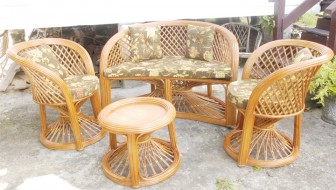Douglas Deen is anticipating his company’s third consecutive appearance at GuyExpo at September month end. He has spent the last four years trying to break into the local and export markets for wicker furniture and he believes that he may well be on the threshold of success.
Deen’s Wicker Furniture is situated in Victoria Road, Plaisance and while there are still obstacles to the breakthrough which he seeks, Douglas thrives on limitless persistence and a sense of optimism that never seems to desert him.

Deen considers himself as much a craftsman as a builder. Wicker apart, his furniture is woven around wooden frames utilizing various other vines including Nibbi, Rattan and Cufa. When dried the vines are not only sturdy enough to be used in the manufacture of chairs and tables but also of a texture that allows them to be treated with lacquers and polish. Deen explains, however, that considerations of quality have compelled him to seek to acquire vines in areas other than the Pomeroon River. Mabura has been his most recent source of vines. At intervals and accompanied by his workers, he travels to Mabura twice monthly and spends a day or two selecting and cutting vines. Otherwise, he hires persons from the area to secure the vines. Supplies are currently hampered by the ongoing unrest at Linden. He is currently exploring additional sources at St Cuthbert’s Mission and Parika.
Like most local craftsmen Douglas Deen’s ambitions are restricted by the limits of his resources. In the absence of collateral he has already been refused a loan by the commercial banking sector and must make do with a smaller offer from the Institute of Private Enterprise Development (IPED). As a consequence he remains unable to break into what he says is a potentially lucrative CARICOM market which includes Barbados, Trinidad and Tobago and Suriname. Liquidity is his major problem. Filling a 20-foot container with furniture for export requires an investment of $1.9 million. Shipping costs amount to a further $200,000.00. Having made that investment amounting to $2.2 million Douglas must wait until the consignment is landed and inspected – and sometimes a good deal longer – before payment is made. After two or three shipments to CARICOM countries he was forced to discontinue furniture exports. These days he is restricted to shipping wooden frames to a client in Tobago who has agreed to make ‘up front’ payments to him. He wants to return to actual furniture exports but simply cannot afford it. For the time being he is confined to the local market.
Deen says that material and labour costs make wicker furniture more costly to produce than upholstered options. Apart from the difficulties associated with acquiring the vines, the skills involved in weaving them into decorative patterns are considered specialized and therefore costly to acquire. Understandably, he requires a deposit with every order. In the process he takes upon himself the responsibility of delivering products of an acceptable quality.
Prior to establishing his own business, Deen worked as an upholsterer with an uncle at Mon
Repos, a few miles east of where he now operates in Plaisance. His experience as an upholsterer allows him to secure additional earnings turning out cushions for his uncle. After two years, however, he moved on, joining Samuels Wicker Establishment at Eccles on the East Bank Demerara. During his 12-year sojourn there he learnt several key aspects of the enterprise including the processes of acquiring material, producing furniture and marketing. In the process he visited a number of Caribbean countries.
Four years ago the Samuels establishment changed hands and Deen decided to establish his own wicker business in Plaisance. He is open about the challenges which he has had to confront as a business owner. The first year, he says, was “not good.” He had discovered that owning a business meant assuming responsibility for both production and management and the twin challenges took their toll. Deen credits his improvement with persistence. He also credits his participation in GuyExpo two years ago with a significant shift in his fortunes.
The event allowed him a more expansive marketing opportunity. He began to engage the proprietors of hotels, guest houses, offices and other business establishments. That exposure allowed for expansion into a whole new range of furniture ideas. He began to embrace new designs suitable for bars, lobby area and patios. In addition to furniture on display, Deen also manufactures items based on customer orders.
The weeks ahead are demanding ones for Deen. The $250,000.00 investment which he has made in this year’s GuyExpo may seem like a modest sum to a larger enterprise; for him it is an important investment and he is determined that it will pay off. His booth will boast new designs and, additional local patronage apart; he will be on the lookout for visitors from the Caribbean who may well be interested in entering into long-term business agreements with him that allow for his re-entry into the export market.




